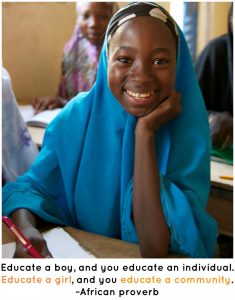by Shelton Owen
As I soak up the bittersweet last moments of my senior year of high school, I sense my departure for college inching closer. The school year has been packed with applications, scholarship essays, and an abundance of rigorous preparations for the next chapter of my educational career. It wasn’t until recently, when prompted by a scholarship application, that I thoroughly considered the question, “Why do I want to attend college?” I have never really thought of college as an “option.” It was always just the next logical next step: high school, college, possibly professional school, job. That was the path laid before me, my path for success.
When I sat down with my hands on the keyboard to describe the benefits of college, both personally and professionally, I began to grasp the magnitude of the blessing I am about to receive. The mere fact that I am a female with such wide open doors to the future is no small thing. Susan B. Anthony would be dumbfounded and elated if she knew that not only can women vote, they can now run for president of the United States.
Here I am at eighteen, with the world as my canvas. The brushes and colors I will use are entirely up to me. Though empowerment courses through my veins, humility runs alongside. From research, travel, and my work with Wells Bring Hope, I’ve acquired a global mindset that no longer allows me to live in my own little bubble. The harsh reality of gender inequality in nations such as Niger pops that bubble of oblivion right open.
According to the UN Human Rights Index, only 17.1% of Nigerien women between the ages of 15 and 24 are literate. To add to that, the net enrollment ratio of young women in secondary school is a minuscule 9.6%. Put another way, less than 4% of Nigerien women receive any secondary education. In fact, the average girl in Niger receives fewer than five years of formal education. These devastating statistics are due in no small part to the fact that in villages without a well, it is the women and girls who spend hours every day walking for water. The enormous burden leaves little time for education or income-generating work.
High school, which I grumble to wake up early for, is a privilege denied to the vast majority young women in Niger. I imagine that there are many girls in rural Niger who would be thrilled to wake up early if it meant the chance to sit in a classroom. When girls are denied an education, they tend to marry and have children at a much younger age. This contributes to Niger’s high rate of maternal mortality. Of course, when women lag behind in education, their options in life are limited and they remain dependent on their fathers and husbands. Microfinance training programs like those provided by WBH, empower women to stand on their own two feet and unlock a realm of independence once sealed shut by tradition, social prejudice, and a lack of education.

As I prepare to begin college classes this fall, I will give thanks to pioneers like Susan B. Anthony who pushed the boundaries, persevered, and paved the path of success for future generations of women, including myself. I will think about the progress still to be made, and I will give thanks for organizations like Wells Bring Hope that are pushing forward to create new opportunities for the women and girls of Niger.


